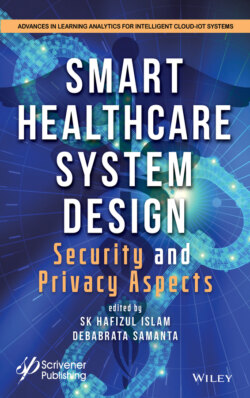Читать книгу Smart Healthcare System Design - Группа авторов - Страница 2
Table of Contents
Оглавление1 Cover
2 Title Page
3 Copyright
4 Dedication
5 Preface
6 Acknowledgments
7 1 Machine Learning Technologies in IoT EEG-Based Healthcare Prediction 1.1 Introduction 1.2 Related Works 1.3 Problem Definition 1.4 Research Methodology 1.5 Result and Discussion 1.6 Conclusion
8 2 Smart Health Application for Remote Tracking of Ambulatory Patients 2.1 Introduction 2.2 Literature Work 2.3 Smart Computing for Smart Health for Ambulatory Patients 2.4 Challenges With Smart Health 2.5 Security Threats 2.6 Applications of Fuzzy Set Theory in Healthcare and Medical Problems 2.7 Conclusion
9 3 Data-Driven Decision Making in IoT Healthcare Systems—COVID-19: A Case Study 3.1 Introduction 3.2 Experimental Analysis 3.3 Multi-Criteria Decision Making (MCDM) Procedure 3.4 Conclusion
10 4 Touch and Voice-Assisted Multilingual Communication Prototype for ICU Patients Specific to COVID-19 4.1 Introduction and Motivation 4.2 Proposed Prototype of Touch and Voice-Assisted Multilingual Communication 4.3 A Sample Case Study 4.4 Conclusion
11 5 Cloud-Assisted IoT System for Epidemic Disease Detection and Spread Monitoring 5.1 Introduction 5.2 Background & Related Works 5.3 Proposed Model 5.4 Methodology 5.5 Performance Analysis 5.6 Future Research Direction 5.7 Conclusion
12 6 Impact of Healthcare 4.0 Technologies for Future Capacity Building to Control Epidemic Diseases 6.1 Introduction 6.2 Background and Related Works 6.3 System Design and Architecture 6.4 Methodology 6.5 Performance Analysis 6.6 Future Research Direction 6.7 Conclusion
13 7 Security and Privacy of IoT Devices in Healthcare Systems 7.1 Introduction 7.2 Background and Related Works 7.3 Proposed System Design and Architecture 7.4 Methodology 7.5 Performance Analysis 7.6 Future Research Direction 7.7 Conclusion
14 8 An IoT-Based Diet Monitoring Healthcare System for Women 8.1 Introduction 8.2 Background 8.3 Necessity of Wearable Approach? 8.4 Different Approaches for Wearable Sensing 8.5 Description of the Methodology 8.6 Description of Various Components Used 8.7 Strategy of Communication for Wearable Systems 8.8 Conclusion
15 9 A Secure Framework for Protecting Clinical Data in Medical IoT Environment 9.1 Introduction 9.2 Medical IoT Application Domains 9.3 Medical IoT Concerns 9.4 Need for Security in Medical IoT 9.5 Components for Enhancing Data Security in Medical IoT 9.6 Vulnerabilities in Medical IoT Environment 9.7 Solutions for IoT Healthcare Cyber-Security 9.8 Execution of Trusted Environment 9.9 Patient Registration Using Medical IoT Devices 9.10 Trusted Communication Using Block Chain 9.11 Conclusion
16 10 Efficient Data Transmission and Remote Monitoring System for IoT Applications 10.1 Introduction 10.2 Network Configuration 10.3 Data Filtering and Predicting Processes 10.4 Experimental Setup 10.5 Conclusion
17 11 IoT in the Current Times and its Prospective Advancements 11.1 Introduction 11.2 How IIoT Advances Industrial Engineering in Industry 4.0 Era 11.3 IoT and its Current Applications 11.4 Application Areas of IIoT 11.5 Challenges of Existing Systems 11.6 Future Advancements 11.7 Case Study of DeWalt 11.8 Conclusion
18 12 Reliance on Artificial Intelligence, Machine Learning and Deep Learning in the Era of Industry 4.0 12.1 Introduction to Artificial Intelligence 12.2 AI and its Related Fields 12.3 What is Industry 4.0? 12.4 Industrial Revolutions 12.5 Reasons for Shifting Towards Industry 4.0 12.6 Role of AI in Industry 4.0 12.7 Role of ML in Industry 4.0 12.8 Role of Deep Learning in Industry 4.0 12.9 Applications of AI, ML, and DL in Industry 4.0 12.10 Challenges 12.11 Top Companies That Use AI to Augment Manufacturing Processes in the Era of Industry 4.0 12.12 Conclusion
19 13 The Implementation of AI and AI-Empowered Imaging Systems to Fight Against COVID-19—A Review 13.1 Introduction 13.2 AI-Assisted Methods 13.3 Optimistic Treatments and Cures 13.4 Challenges and Future Research Issues 13.5 Conclusion
20 14 Implementation of Machine Learning Techniques for the Analysis of Transmission Dynamics of COVID-19 14.1 Introduction 14.2 Data Analysis 14.3 Methodology 14.4 Results and Discussions 14.5 Conclusions
21 Index
22 End User License Agreement
